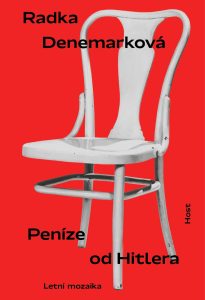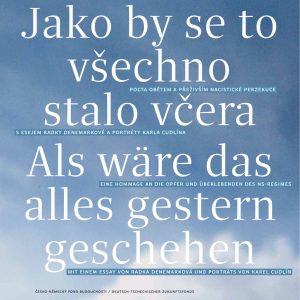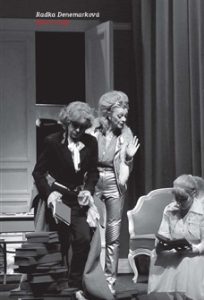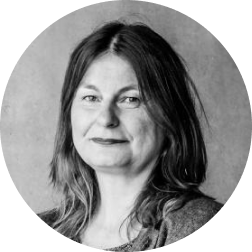Writer, literary historian
screenwriter, translator
German works and dramaturgy.
RADKA
DENEMARKOVÁ
books
theatre
fiction
translations
other activities
AWARDS AND SCHOLARSHIPS
2022
The Literary Prize of Styria (Austria) for a Novel of Leaden Hours.
2019
The H.C. Artmann Scholarship in Salzburg, Austria (novel Contribution to the History of Joy).
2019
Magnesia Litera Book of the Year Award (novel Leaden Hours)
2019
Leuk Literature Prize, Switzerland
2017
Honorary Writer of the City of Graz Award 2017/2018, Austria
2016
WALD Press AWARD for a literary work that examines further possibilities of the novel form and at the same time bravely opens tabooed topics concerning the weaker and vulnerable
2012
Georg-Dehio-Buchpreis (Georg Dehio Prize), Germany, Berlin (novel Money from Hitler)
2012
Annual Mladá fronta Publishers Prize for the translation of Herta Müller’s book Heart of the Beast (Herztier)
2011
German Critics’ Prize Usedomer Literaturpreis (Usedom Literary Prize) (novel Money from Hitler)
2011
Magnesia Litera Award for best translation (Herta Müller: Unsteady Breath / Atemschaukel)
2009
Magnesia Litera Award for best book in the category of journalism (documentary novel Death, You Will Not Be Afraid or The Story of Petr Lébl)
2007
Magnesia Litera Award for the best prose of the year (novel Money from Hitler)
SELECTION OF REVIEWS
MONEY FROM HITLER is a book that literally shakes you up.
The novel tells a classic story of persecution and expulsion, and the struggle to achieve justice.
Radka Denemarková has created a substantial and literary contribution to the great chronicle of the history of German-Czech-Jewish relations.
From the statement of the Georg Dehio Prize jury
The author’s approach to the subject is somewhat different than one might expect, she certainly does not limit herself to historical facts, which are often repeated only as facts about something that happened years ago, which can evoke emotions, but there are limits beyond which they cannot go.
Radka Denemarková is a great writer, but more important is her insight.
Both of these qualities meet in symbiosis, she can find words that express deep thoughts.
And it should be noted that these are primarily her thoughts, although she can extract important elements of other thinkers’ work and synthesize them in an original way.
Jiří Lojín, VašeLiteratura.cz
Radka Denemarková has joined those who are suspected of winning the Nobel Prize in Literature
Daniela Strigl, Ex libris, ÖRF Ö1
In love with language and metaphors, she is a great breaker of taboos and an authority on the themes of contemporary Czech literature.
Neue Zürcher Zeitung
Radka Denemarková has joined those who are suspected of winning the Nobel Prize in Literature
Daniela Strigl, Ex libris, ÖRF Ö1
The Hours of Lead is an unusually large and multi-layered novel that is purposefully conceived as a political work of art that wants to have an impact.
It thematises the contemporary face of Chinese society as a totalitarian regime, but at the heart of this view is not so much the way society functions as the fate of those who find themselves in the position of victim.
The novel’s execution resigns to the traditional conception of the characters as unique beings to whom often random events happen.
The characters of The Hours of Lead represent symbolic types, as in the tradition of ancient myth.
They represent the professions, actions and attitudes through which the chillingly fateful events are played out.
Here, private destinies are completely ensnared by the unstoppable mechanisms of society: the rise of China’s power is at the same time the counterpoint to the collapsing values of European civilisation, which is in a crisis from which there is no way out.
The Lead Clock is an attempt to write a novel that is meant to disabuse the reader of the miserable feeling that he is reading “just” a well-crafted story.
The Magnesia Litera Prize jury.
Denemark skillfully and with novel linguistic skills connects worlds and political systems.
Bernd Melichar, Kleine Zeitung
HOURS FROM OLOV in no way and nowhere and never conceals the fact that it is a politically engaged book.
The fact that Radka Denemarková is able to translate her undisguised literary commitment into such a breathtaking poetic language and such an original form makes her one of the most interesting contemporary authors ever.
Veronika Schuchter, Die Furche
Radka Denemarková writes with great sensitivity and openness, without focusing on herself.
As a committed writer with a great deal of range, she uses personal experience, foreign travel experiences and attitudes to draw attention to diverse foreign worlds, portray socially crucial topics and bring complex intellectual and artistic testimony.
Her intransigence goes hand in hand with a profound reflection that constantly re-examines all events and circumstances of human destinies: she does so in unison with linguistic brilliance and depth of content.
Jury of the Styrian Literary Prize
The book is a colossus, even from a purely external point of view – but a colossus that opens up whole worlds.
Cornelia Geißler, Berliner Zeitung
It can be read as a remarkable factual testimony to the dual struggle for identity: first of the novel’s protagonist, then, as the writing progresses, more and more insistently of its author.
Viola Fischerová, in the poll of Lidové noviny BOOK OF THE YEAR 2009







